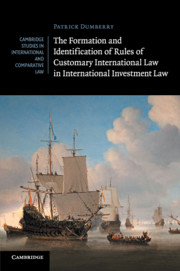Book contents
- Frontmatter
- Dedication
- Contents
- Foreword
- Preface
- Acknowledgments
- List of abbreviations
- Introduction
- 1 The concept of customary international law
- 2 Dancing with the sources: the fascinating story of the relative importance of custom and treaties at different times in the evolution of international investment law
- 3 State practice
- 4 Opinio juris
- 5 The fundamental importance of customary rules in international investment law
- General conclusion
- Bibliography
- Index
- cambridge studies in international and comparative law
Introduction
Published online by Cambridge University Press: 05 May 2016
- Frontmatter
- Dedication
- Contents
- Foreword
- Preface
- Acknowledgments
- List of abbreviations
- Introduction
- 1 The concept of customary international law
- 2 Dancing with the sources: the fascinating story of the relative importance of custom and treaties at different times in the evolution of international investment law
- 3 State practice
- 4 Opinio juris
- 5 The fundamental importance of customary rules in international investment law
- General conclusion
- Bibliography
- Index
- cambridge studies in international and comparative law
Summary
The scope of this book
Rules of customary international law are binding on all States. They gradually develop over time based on the uniform and consistent practice of a large number of representative States, which have the conviction (or the belief) that such practice is required by law (opinio juris). The general aim of this book is to provide a comprehensive analysis of the phenomenon of custom in the context of international investment law (also known as investor-State arbitration). No book on international investment law has ever focused specifically on custom. In fact, only a limited number of books and articles have been published on the fundamental question of the sources of international investment law. As noted by d'Aspremont, ‘the scholarship on international investment law has remained bereft of theoretical reflection on the sources of investment law’. He believes that ‘international investment law has now reached a stage of its development where the doctrine of sources can no longer be left in limbo and needs to be critically explored’ so that this field of law ‘rests on solid bases in terms of sources’. He is right.
But why should one enquire about customary rules in today's international investment law when foreign investors, in fact, obtain sufficient protection under the numerous investment treaties that have been entered into by States in recent decades? As noted by one writer, ‘for all practical purposes, treaties have become the fundamental sources of international law in the area of foreign investment’. The basic reasons for the remaining importance of custom have been identified by the Iran–US Claims Tribunal in the Amoco case: ‘the rules of customary law may be useful in order to fill in possible lacunae of the treaty, to ascertain the meaning of undefined terms in the text or, more generally, to aid the interpretation and implementation of its provision’.
The first reason for the continuing importance of custom in today's investment arbitration is because these rules represent the applicable legal regime of protection in the absence of any BIT. However numerous BITs have become, they still do not cover the whole spectrum of possible bilateral treaty relationships between States. This necessarily results in gaps in the legal protection of foreign investments.
- Type
- Chapter
- Information
- The Formation and Identification of Rules of Customary International Law in International Investment Law , pp. 1 - 13Publisher: Cambridge University PressPrint publication year: 2016

